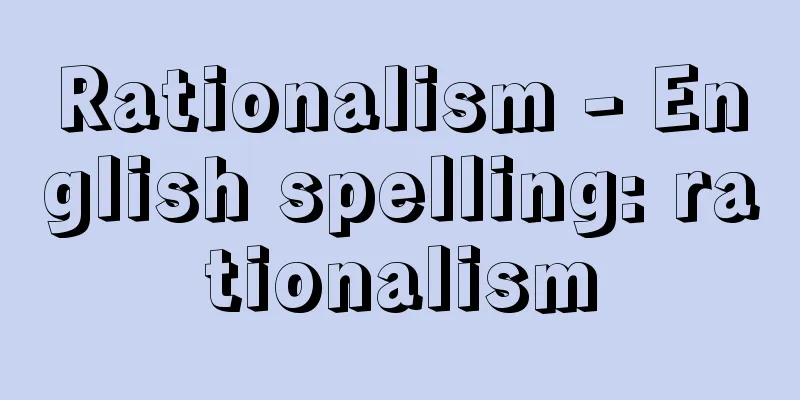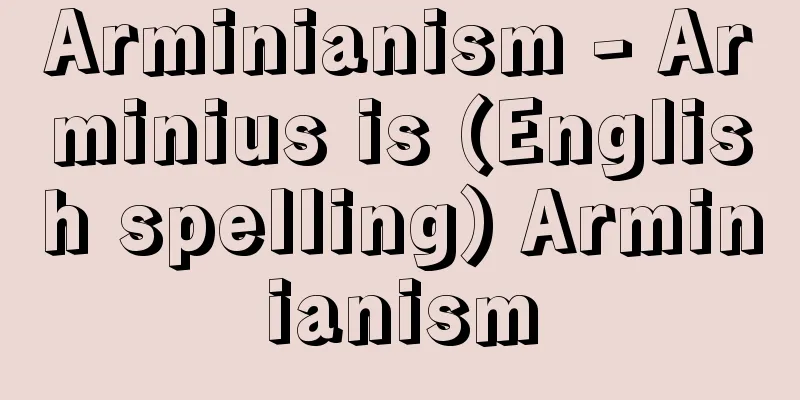Rationalism - English spelling: rationalism

|
A position that rejects the irrational and accidental and respects the rational, logical, and necessary. It is also called rationalism, rationalism, and rationalism. It can also refer to a lifestyle that respects only rational principles as a practical standard. In metaphysics, it is a theory that reason and logic govern the world thoroughly, and that there is nothing in this world that does not have a reason for existence, and is represented by the philosophy of contemplative rationalism in the classical Greek period. In theology, it is a position that seeks not only to know the truth of faith revelatory in the light of grace, but also to understand it rationally as much as possible through the light of nature. [Katsuhiko Ito] Descartes and the Mechanistic View of NatureDescartes, a 17th century philosopher, is known as the father of modern rationalism. Encouraged by the success of his theoretical research in applying mathematical solutions to physics, he generalized this physical and mathematical method and arrived at the idea of a universal method applicable to all academic fields. In other words, he conceived of "universal mathematics." With the establishment of this idea, the only task of natural research became to identify the quantitative relationships that govern the universe. The changes in the movement of objects were understood entirely quantitatively, and the methods of Aristotle and scholastic philosophy, which explained this as a transition from potential to actual, were naturally rejected. The idea of mathematical rationality was established, and it became believed that all natural events could be understood as a chain of inevitable causality. In this way, the so-called mechanistic view of nature was established, in which the entire natural world was considered to be one giant mechanism that followed the laws of causality. At the same time that the mechanization of the world was being thoroughly promoted, the human mind was established as an intelligent subject independent of the world. As Heidegger said, "man became the subject" was the most important change in modern times. Moreover, this change took place in a single era, the 17th century. It was Francis Bacon who said, "knowledge is power," but in order to realize domination of nature through science, it was first necessary for humans to reign over the world as intelligent subjects. A rational understanding of the natural world, that is, its thorough mechanization, was only possible through such a subject independent of the world. [Katsuhiko Ito] Influence on modern thoughtDescartes's ideas had a particularly large influence on the so-called continental rationalists, such as Spinoza, Leibniz, and Wolff (1679-1754). A common characteristic of these thinkers was their absolute trust in mathematical methods. Spinoza inherited Descartes' ideas and applied geometric methods to philosophy, trying to make philosophy a rigorous demonstrative science. Leibniz invented the "art of combination," which uses mathematical symbols to mathematically deduce all truths from the simplest truths. Rationalism is opposed to empiricism, especially from the epistemological point of view that questions the origin of knowledge. In other words, while empiricism holds that all knowledge arises from experience, rationalism takes the position that all certain knowledge originates from innate and evidential principles. Empiricism starts from individual sensory impressions, but rationalism starts from general concepts and fundamental principles of the understanding, and disregards sensory experience as confused. In terms of method, empiricism values observation and inductive methods, while rationalism values deductive methods. Although these differences are certainly recognized as a general tendency, Descartes did not only influence continental rationalism. He also had a great influence on the British thinkers Hobbes and Locke. In fact, most modern thinkers share the spirit of Descartes. The opening words of Descartes' Discourse on Method, "good sense is the most fairly distributed thing in the world" as a human rational faculty, have continued to inspire the modern spirit. In this broadest sense, Descartes' rationalism can be said to be the ideological source of modern Europe. [Katsuhiko Ito] "Ito Katsuhiko, editor, "History of Thought" (1972, Shinyosha)" ▽ "Ito Katsuhiko, "Descartes' Image of Man" (1970, Keiso Shobo)" ▽ "Cassirer, "Philosophy of the Enlightenment" translated by Nakano Yoshiyuki (1962, Kinokuniya Shoten)" [References] | | | | | | | | | | |Source: Shogakukan Encyclopedia Nipponica About Encyclopedia Nipponica Information | Legend |
|
非合理的、偶然的なものを排し、理性的、論理的、必然的なものを尊重する立場。合理論、理性論、理性主義などともいう。実践的規準として、理性的原理だけを尊重する生活態度をさしていうこともある。形而上(けいじじょう)学的には、理性や論理が世界をくまなく支配していて、この世に存在理由をもたないものはなにもありえないという説で、ギリシア古典期の観想的理性主義の哲学がその代表である。神学的には、信仰の真理を恩寵(おんちょう)の光に照らして啓示的に知るだけでなく、可能な限り自然の光によって理性的に認識しようとする立場をいう。 [伊藤勝彦] デカルトと機械論的自然観近代合理主義の父とよばれるのが17世紀のデカルトである。彼は物理学に数学的解法を適用する理論的研究の成功に力を得て、この物理・数学的方法を一般化し、あらゆる学問に通じる普遍的方法の理念に到達した。つまり、「普遍数学」の構想がそれで、この考えが確立するとともに、宇宙を支配している数量的関係をつきとめることが自然研究の唯一の課題となる。物体の運動変化はまったく数量的に把握され、可能態から現実態への移行としてこれを説明するアリストテレスやスコラ哲学の方式は当然否定される。数学的合理性の観念が確立され、自然のできごと全体を必然的な因果の連鎖でとらえ尽くすことができると考えられるようになる。こうして、自然の世界全体が因果の法則に従った一つの巨大なメカニズムであるとみなすところの、いわゆる機械論的自然観が成立することとなる。 世界の機械論化が徹底して推し進められると同時に、人間の精神は世界から独立した知的主体として確立される。ハイデッガーのいうように、「人間が主体になった」ということが近代におけるもっとも重要な変化であった。しかも、このような変化は17世紀という一時代に起きたことであった。「知は力である」といったのはフランシス・ベーコンであったが、科学による自然支配が実現されるためには、まずもって人間が知的主体として世界に対して君臨することが必要であった。自然的世界の合理的把握、つまりその徹底した機械論化は、このような、世界とは独立な主体によってのみ可能であったのである。 [伊藤勝彦] 近代思想への影響デカルトの思想は、スピノザ、ライプニッツ、ボルフChristian Wolff(1679―1754)などの、いわゆる大陸合理論にとくに大きな影響を与えた。彼らに共通する性格は、数学的方法に対する絶対的信頼ということであった。スピノザはデカルトの考えを受け継ぎ、幾何学的方法を哲学に応用して、哲学を厳密な論証的学問にしようとした。ライプニッツは数学的記号を使って、もっとも単純な真理からすべての真理を演算的に演繹(えんえき)しようとする「結合術」を考え出した。 合理論はとりわけ、認識の起源を問題にする認識論的見地から、経験論に対立する。すなわち、すべての認識は経験から生ずるとなす経験論に対し、合理論は、すべての確実な認識は生得的で、明証的な原理に由来するという立場にたつ。経験論は個々の感覚的印象から出発するが、合理論は一般概念と悟性の根本原理から出発し、感覚的経験を混乱したものとして軽視する。方法としては、経験論が観察と帰納的方法を重んじるのに対し、合理論は演繹的方法を重んじる。一般的傾向としては確かにこういう違いが認められるが、デカルトは大陸合理論にのみ影響を与えたわけではない。イギリスのホッブズやロックにも大きな影響を与えた。いや、それどころか、ほとんどの近代思想家がデカルトの精神を分有している。人間の理性能力としての「良識はこの世でもっとも公平に配分されているものである」という、デカルトの『方法序説』冒頭のことばは、近代精神を鼓舞し続けてきた。そういう最広義の意味では、デカルトの合理主義は近代ヨーロッパの思想的源泉であるということができるであろう。 [伊藤勝彦] 『伊藤勝彦編『思想史』(1972・新曜社)』▽『伊藤勝彦著『デカルトの人間像』(1970・勁草書房)』▽『カッシラー著、中野好之訳『啓蒙主義の哲学』(1962・紀伊國屋書店)』 [参照項目] | | | | | | | | | | |出典 小学館 日本大百科全書(ニッポニカ)日本大百科全書(ニッポニカ)について 情報 | 凡例 |
Recommend
Hershey, Alfred Day
Born: December 4, 1908 in Owosso, Michigan [Died] ...
Hui faction - Kiha
… The Ming Dynasty's Wen Peng (1498-1573) was...
Colombe, M.
…French manuscript illustrator. Born into a famil...
Ezorurisou - Ezorurisou
...The nature of the seashore-dwelling, fleshy na...
Kiami
Year of birth: Year of birth and death unknown. An...
Marine erosion
...This is called a Yardang and is a strangely sh...
Choreographer
…Chorégraphe (choreographer). In English, choreog...
Matsuoka [town] - Matsuoka
A former town in Yoshida County, northern Fukui Pr...
Belize City
A city in Belize, a newly emerging Central America...
Choshoji Temple
A temple located in Nara City. It is also written ...
Acheilognathus tabira (English spelling) Acheilognathus tabira
…[Morizumi Nakamura]. … *Some of the terminology ...
Foreign company - gaikokukaisha (English spelling) foreign company
A corporation or other foreign organization establ...
Chimney - Ento
1 chimney. "Clouds are moving quickly above t...
Hipster
...In Japan, the influence of hipsters can be see...
Kaetsu
The name of the northern part of Niigata Prefectur...







![Kosciusko [mountain] - Kosciusko](/upload/images/67cb9370dd0f0.webp)

